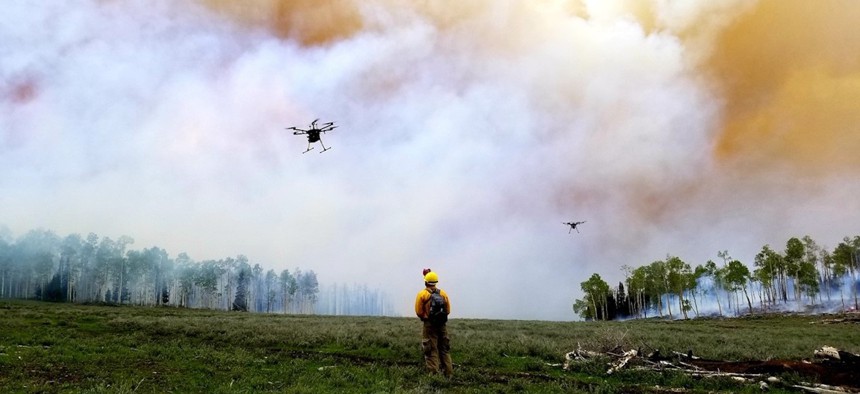
Drone takes off to sample smoke from the Manning Creek stand replacement fire in June 2019. Jesse Juchtzer, Desert Research Institute via U.S. Forest Service/Flickr
With wildfires looming, Congress must act to prevent an exodus of firefighters
COMMENTARY | Firefighters protect communities and people, asking for little in return: equipment to do our jobs safely, benefits that recognize the inherent dangers of our work, and pay that is sufficient to take care of our families, writes one advocate.
As Americans watch their neighbors battle catastrophic wildfires this year, they are haunted by the memories of communities across California, Oregon, Texas, Montana, Wisconsin, Minnesota and other states. It would be naïve to see the flames in Maui and not wonder what this means for the rest of the United States.
These fires highlight the need for more resources on the ground before disaster strikes, because as soon as they are needed, it is often too late. The more wildfire activity there is across the United States, the fewer available resources we have to keep problematic wildfires small and manageable.
For example, California’s heavy winter and spring rainfall and snow delayed the onset of our fire season, but it also produced above average amounts of vegetation, which, once dried, equate to above average amounts of fuel load. These conditions have contributed to what is shaping up to be another catastrophic fire season in Northern California and create the potential for a challenging wildfire season in Southern California. Because of this, the state will need every local, state, and federal firefighter and firefighting resource at the ready come September and October. Unfortunately, one of our most valuable firefighting resources is in jeopardy: federal wildland firefighters.
After federal funding from the Infrastructure Investment and Jobs Act expires at the end of September, federal wildland firefighters could lose half of their base pay up to $20,000 unless lawmakers act. The National Federation of Federal Employees states that a third to half of the 11,000 U.S. Forest Service firefighters could leave their jobs without urgent measures to stabilize their pay and benefits.
Various actions have been taken in the Senate and House of Representatives to protect pay; however, this is an all-hands-on-deck situation: Americans desperately need Congress to secure adequate federal firefighters’ paychecks. If Congress does not quickly act and deliver for the American people, federal firefighting agencies — who are already struggling to recruit and maintain sufficient staff levels — will likely experience a mass exodus of headcount in the middle of fire season.
The lack of staffing will further hamstring federal firefighting capabilities. This means fewer firefighters and less equipment to attack the fires when they start. This could result in fires burning for longer periods of time and causing more destruction to communities and our American forests and could likely result in tragic losses of life, natural resources, and property. The communities and surrounding areas could suffer from dangerous air quality conditions in the short-term, and they would struggle with recovery from the economic devastation for years to come. Those most vulnerable, the young, the elderly, and the immuno-compromised, could be more susceptible to respiratory health complications.
As we’ve witnessed on the East Coast and in the Midwest, U.S. cities have been waking up to some of the worst air quality in the world from Canadian and U.S. wildfires, and that will only continue to worsen as we move deeper into the season. Just last week, Seattle’s air quality was listed as the worst in the world as smoke from the Sourdough Fire made its way into Puget Sound.
Furthermore, this potential gap in emergency staffing makes operations more dangerous, and it causes greater concern for the mental health and physical well-being of exhausted firefighters.
Firefighters protect communities and people, asking for little in return: equipment to do our jobs safely, benefits that recognize the inherent dangers of our work, and pay that is sufficient to take care of our families. We are part of our threatened communities. Congress needs to show that they are here for us.
Lucas Mayfield is the president of Grassroots Wildland
NEXT STORY: A Question of Survival






